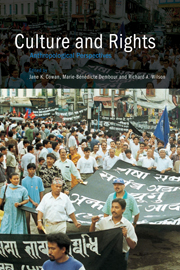Book contents
- Frontmatter
- Contents
- List of contributors
- Preface
- 1 Introduction
- Part I Setting universal rights
- Part II Claiming cultural rights
- 7 Ambiguities of an emancipatory discourse: the making of a Macedonian minority in Greece
- 8 From group rights to individual rights and back: Nepalese struggles over culture and equality
- 9 Advancing indigenous claims through the law: reflections on the Guatemalan peace process
- 10 Rights as the reward for simulated cultural sameness: the Innu in the Canadian colonial context
- Index
8 - From group rights to individual rights and back: Nepalese struggles over culture and equality
Published online by Cambridge University Press: 05 June 2012
- Frontmatter
- Contents
- List of contributors
- Preface
- 1 Introduction
- Part I Setting universal rights
- Part II Claiming cultural rights
- 7 Ambiguities of an emancipatory discourse: the making of a Macedonian minority in Greece
- 8 From group rights to individual rights and back: Nepalese struggles over culture and equality
- 9 Advancing indigenous claims through the law: reflections on the Guatemalan peace process
- 10 Rights as the reward for simulated cultural sameness: the Innu in the Canadian colonial context
- Index
Summary
Introduction: Nepal's South Asian context
‘Cultural rights are now widely recognized as deserving the same protection as human rights.’ So says an authoritative recent UNESCO publication, which is examined in detail by Eriksen in chapter 6. The rise of this kind of rights discourse, with its emphasis on the rights of minority cultures, is, as the introduction to this book charts, a global phenomenon; arguably it is itself an aspect of globalization. This discourse of cultural rights is problematic on several counts. Within liberal political and juridical theory it presents a fundamental challenge to more traditional ways of conceiving rights. Are there any cultural rights? Do only individuals have rights or should groups defined by a shared culture be granted rights that would enable them to impose their standards on the individuals who belong to them? Furthermore, the term ‘cultural rights’ can mean both (1) rights to culture, i.e. to maintain cultural differences, with state and legal support if necessary, and (2) differential rights to political and economic resources on the basis of cultural difference. Perhaps most problematic of all, this discourse assumes that every group possesses a shared and distinctive culture which marks it off from other groups. In fact, in actual social situations, as opposed to the thought experiments of philosophers, what is to count as cultural difference, and who can claim it, are highly political and often fiercely contested questions – a contention that will be amply illustrated, I hope, by the case study presented in this paper.
- Type
- Chapter
- Information
- Culture and RightsAnthropological Perspectives, pp. 177 - 200Publisher: Cambridge University PressPrint publication year: 2001
- 6
- Cited by

